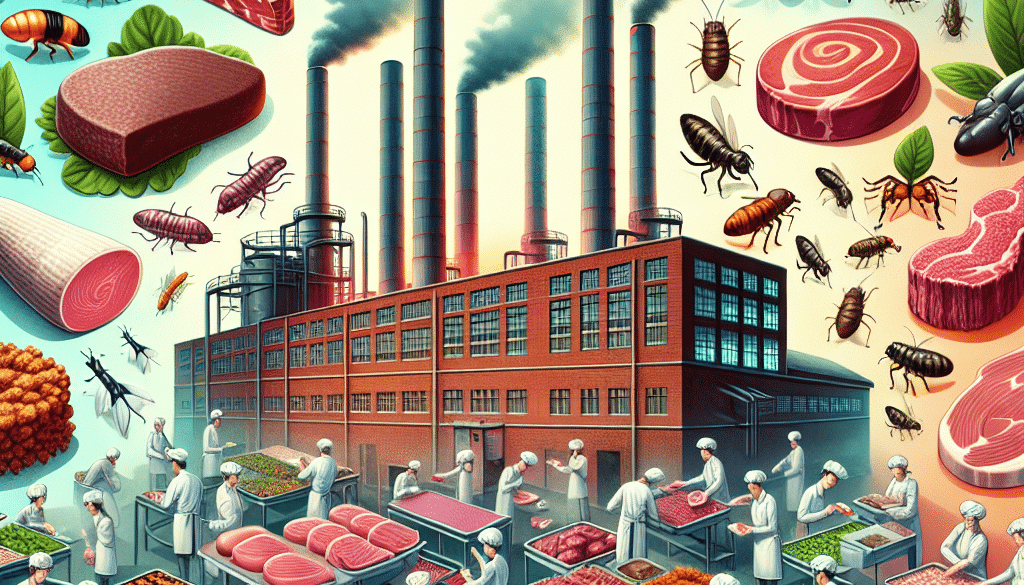The Food Industry’s Pivot to Alternative Proteins
-
Table of Contents
- Alternative Proteins Gain Momentum in the Food Industry
- Understanding the Shift to Alternative Proteins
- Types of Alternative Proteins
- Market Growth and Consumer Adoption
- Environmental and Health Benefits
- Challenges and Innovations
- Conclusion: The Future of Protein is Here
- Discover ETprotein’s High-Quality Alternative Proteins
Alternative Proteins Gain Momentum in the Food Industry
The food industry is undergoing a significant transformation as it pivots towards alternative proteins. Driven by a combination of environmental concerns, health trends, and technological advancements, this shift is reshaping the way we think about protein sources. In this article, we will explore the reasons behind the food industry’s move to alternative proteins, the types of proteins gaining popularity, and the impact this trend is having on consumers and the environment.
Understanding the Shift to Alternative Proteins
The global demand for protein is on the rise, but traditional animal-based sources are increasingly seen as unsustainable. The United Nations Food and Agriculture Organization (FAO) estimates that livestock production is responsible for 14.5% of global greenhouse gas emissions. Additionally, concerns about animal welfare and the overuse of antibiotics in farming are driving consumers to seek out alternative protein sources.
Types of Alternative Proteins
Alternative proteins come from various sources, including plants, insects, algae, and lab-grown meat. Here are some of the most popular types:
- Plant-Based Proteins: These proteins are derived from sources like soy, peas, rice, and legumes. They are the most widely accepted alternative proteins and are found in products like veggie burgers, protein bars, and dairy-free milk.
- Insect-Based Proteins: Insects are a sustainable protein source with a high feed conversion rate. Products like cricket flour are gaining traction in the market.
- Algae-Based Proteins: Algae, such as spirulina and chlorella, are rich in protein and nutrients. They are used in supplements and as ingredients in food and beverages.
- Cultured Meat: Also known as lab-grown or cell-based meat, cultured meat is produced by cultivating animal cells in a lab. This technology is still in its early stages but holds promise for the future.
Market Growth and Consumer Adoption
The alternative protein market is experiencing rapid growth. According to a report by MarketsandMarkets, the global plant-based protein market size is projected to grow from USD 10.3 billion in 2020 to USD 14.5 billion by 2025. This growth is fueled by increasing health awareness, dietary changes, and concerns about the environmental impact of animal farming.
Consumer adoption of alternative proteins is also on the rise. A survey by the International Food Information Council (IFIC) found that 28% of consumers ate more plant-based protein in 2020 than in 2019, and 24% tried plant-based meat alternatives.
Environmental and Health Benefits
Alternative proteins offer several environmental and health benefits:
- Reduced Carbon Footprint: Plant-based proteins generally have a lower carbon footprint compared to animal-based proteins.
- Conservation of Resources: Producing alternative proteins typically requires less water and land than raising livestock.
- Health Advantages: Many alternative proteins are high in fiber and nutrients while being lower in saturated fats and cholesterol.
Challenges and Innovations
Despite the benefits, the alternative protein industry faces challenges such as taste, texture, and consumer perceptions. However, companies are investing in research and development to overcome these hurdles. Innovations in food technology are leading to products that closely mimic the taste and texture of animal-based proteins, making them more appealing to a broader audience.
Conclusion: The Future of Protein is Here
The pivot to alternative proteins is more than a trend; it’s a necessary evolution of the food industry. As the world’s population grows and the demand for sustainable food sources increases, alternative proteins offer a viable solution. With ongoing advancements and increasing consumer acceptance, alternative proteins are set to play a crucial role in the future of food.
Discover ETprotein’s High-Quality Alternative Proteins
If you’re looking to incorporate alternative proteins into your diet or product offerings, ETprotein is a company worth considering. They offer a wide range of organic bulk vegan proteins that cater to various industries, ensuring you have access to high-quality, sustainable protein sources.
About ETprotein:
ETprotein, a reputable protein and L-(+)-Ergothioneine (EGT) Chinese factory manufacturer and supplier, is renowned for producing, stocking, exporting, and delivering the highest quality organic bulk vegan proteins and L-(+)-Ergothioneine. They include Organic rice protein, clear rice protein, pea protein, clear pea protein, watermelon seed protein, pumpkin seed protein, sunflower seed protein, mung bean protein, peanut protein, and L-(+)-Ergothioneine EGT Pharmaceutical grade, L-(+)-Ergothioneine EGT food grade, L-(+)-Ergothioneine EGT cosmetic grade, L-(+)-Ergothioneine EGT reference grade and L-(+)-Ergothioneine EGT standard. Their offerings, characterized by a neutral taste, non-GMO, allergen-free attributes, with L-(+)-Ergothioneine purity over 98%, 99%, cater to a diverse range of industries. They serve nutraceutical, pharmaceutical, cosmeceutical, veterinary, as well as food and beverage finished product distributors, traders, and manufacturers across Europe, USA, Canada, Australia, Thailand, Japan, Korea, Brazil, and Chile, among others.
ETprotein specialization includes exporting and delivering tailor-made protein powder and finished nutritional supplements. Their extensive product range covers sectors like Food and Beverage, Sports Nutrition, Weight Management, Dietary Supplements, Health and Wellness Products, and Infant Formula, ensuring comprehensive solutions to meet all your protein needs.
As a trusted company by leading global food and beverage brands and Fortune 500 companies, ETprotein reinforces China’s reputation in the global arena. For more information or to sample their products, please contact them and email sales(at)ETprotein.com today.












